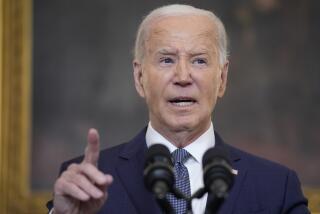PERSPECTIVES ON THE MIDDLE EAST : Steal Iraq’s Thunder on ‘Linkage’ : The coalition arrayed against Saddam Hussein should grab the opportunity to settle the Palestinian issue.
- Share via
Saddam Hussein’s offer to release all of his hostages suggests that he wants to turn the gulf crisis into a long bargaining game--even though he cannot hope to retain Kuwait. But the United States should refuse to be lured and should focus instead on another, far more important bargaining process that could turn the political tables on Baghdad entirely. In fact, we may all owe a significant debt to Hussein: Through his invasion and rape of Kuwait he may have created--quite inadvertently--the wherewithal for a comprehensive peace settlement between Israel and the Arab world.
The Palestinian problem and the gulf crisis are linked not because Hussein says they are, but because no Western intervention in the Arab world can take place without being affected and distorted by the festering Palestinian problem. Hussein is cynically trying to exploit the issue, and he must not be allowed to do so. No deal on a Kuwait-for-Palestine swap. No U.N. conference merely to meet Hussein’s needs. But we must not cede to him the propaganda initiative on regional problems, either.
The wherewithal for a comprehensive settlement may have been forged within the anti-Hussein alliance, and he should continue to be excluded. The most critical new element in the equation is Syria. President Hafez Assad, after decades of leading the “Hell, no” rejectionist camp against any settlement with Israel, can no longer realistically do so. The Soviets have abandoned him and he has been upstaged by Hussein as the Arab world’s leading radical. Assad’s opportunity for a grand strategic shift has arrived, and he may know it. Syria could lead a peace coalition designed to settle the Arab-Israeli issue, deprive Hussein of his ambitions, gain back large parts of the Golan Heights in a comprehensive settlement and take credit for the boldest political turnaround since Anwar Sadat went to Jerusalem.
Assad must bring Yasser Arafat with him. Despite the bad blood between them, there is a deal to be made, and the Soviets can help persuade both sides. Arafat desperately needs to dig himself out of the blunder he made in courting Hussein when the door to a Palestinian state, as he well knows, lies only through Jerusalem and Washington.
A comprehensive peace means Israel must agree to a Palestinian state on the West Bank and Gaza. No settlement will work without it; no moderate Arab coalition will climb on board in its absence. Many in Israel do not want a Palestinian state, but a very sizeable group recognizes that this is ultimately the only way out of the intifada and the increasingly ugly atmosphere in Israel. Prime Minister Yitzhak Shamir and the Likud Party can hardly be expected to agree to a Palestinian state on its own merits. But surely the broader Israeli public and even Shamir will consider giving up the West Bank in return for a genuine, comprehensive peace that would include Egypt, Jordan, Lebanon, Syria, Saudi Arabia and the Palestinians.
Saudi Arabia must give this plan its full backing and be willing to make immediate peace with Israel. Does King Fahd wish to hang back, leave Egypt in the lurch and let Hussein take over the Palestinian cause? The Saudis would have the support of nearly everyone who counts in the Arab world--except enemy Iraq. In addition, Jordan would have to break with Saddam Hussein in the interests of this historic breakthrough. With Palestinian needs met, Jordan would no longer need the Iraqi leader.
Egypt laid the groundwork with the Camp David accords and is the ultimate foundation-stone of a peace coalition, but Egypt should allow Syria to take the lead to further entice Assad. Arafat would have his state, but he would have to recognize the interest of the surrounding nations in the stability of the West Bank state. The total package would establish a comprehensive peace around the periphery of Israel.
Far-fetched? Not really. The anti-Hussein coalition would have turned the tables on Iraq in a stunning political move to reorder the Middle East. Every player would win in this combination--including the United States and Israel. Of course, there are complex, detailed procedural issues--that’s what the professional diplomats get paid for. But the constellation of interests is in place.
This political breakthrough could take place even while the embargo, if extended, continued. Of course, Hussein would try to take credit for the move, but no deal. Let him stew in the juices of the embargo while everyone else settles the strategic equation in the Middle East without him.
It is Hussein’s aggression that created this unprecedented regional coalition, and the window of opportunity may not last forever. Now is the time to explore this extraordinary opportunity for a plan that rewards the peacemakers and confounds the tyrant of Baghdad.
More to Read
Sign up for Essential California
The most important California stories and recommendations in your inbox every morning.
You may occasionally receive promotional content from the Los Angeles Times.












